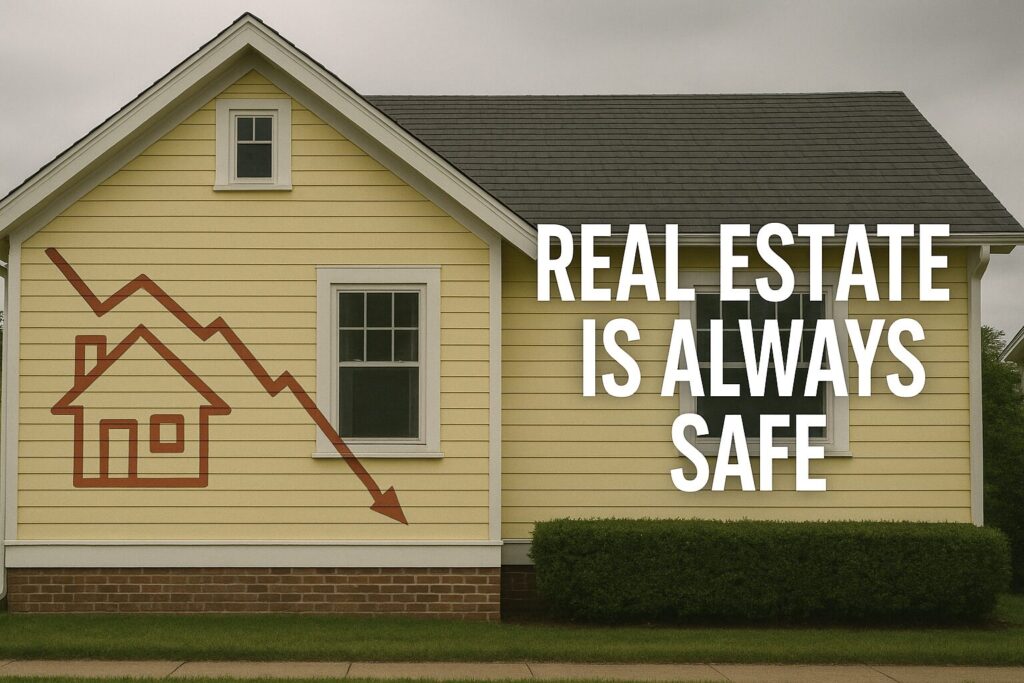
Why Putting Too Much Faith (and Money) in Property Can Backfire in Retirement
Welcome to “Money Myths Retirees Still Believe”—a blog series that uncovers the hidden beliefs that can quietly sabotage your financial peace of mind.
Many retirees cling to common money myths that seem true but can lead to poor decisions, lost income, or unnecessary worry. Each post in this series explores one myth—like “cash is trash” or “I need to beat the market”—and replaces it with a smarter, simpler mindset.
If you’re retired or nearing retirement, this series will help you reassess your approach and feel more confident about your financial future.
The Myth: “Real Estate Is Always Safe”
Ellen, a 69-year-old retiree, had always believed in the power of property. She and her late husband bought their first home in the 1970s for $42,000 and sold it forty years later for over $300,000. “Real estate never lets you down,” she’d say with pride.
Encouraged by past success, Ellen invested most of her retirement savings into a rental duplex. But two years in, one tenant stopped paying rent, the other left without notice, and a leaking pipe caused expensive water damage. Suddenly, Ellen’s “safe” investment was feeling anything but.
She had fallen for a common retirement money myth:
👉 That real estate is always a safe and dependable investment.
The truth? Real estate has risks too—and they’re often overlooked by retirees.
Why This Feels True (But Isn’t)
It’s easy to believe in the safety of real estate:
- You can see it and touch it.
- Property often appreciates over time.
- For many retirees, your biggest financial win was your house.
So it feels natural to assume, “If I want a safe investment, I’ll stick with real estate.” But the reality is a little more complicated.
Yes, property can be a great long-term asset. But it also comes with:
- Liquidity risk – You can’t sell a roof shingle to cover next month’s bills.
- Market risk – Real estate markets go up and down, just like stocks.
- Concentration risk – Putting too much of your wealth into one or two properties ties your future to one local economy.
- Management headaches – Dealing with tenants, repairs, and unexpected expenses can be stressful—especially in retirement.
The Smarter Mindset: Real Estate Is One Asset—Not the Only One
There’s nothing wrong with owning a home or even investing in a rental property if it fits your lifestyle and financial goals. But real estate should be part of a balanced plan, not the entire plan.
Here are safer, more flexible ways to include real estate in your retirement portfolio:
✅ Primary Residence (Paid Off or Low-Mortgage)
A home you live in can offer emotional comfort and financial security—just be sure it’s affordable to maintain.
✅ REITs (Real Estate Investment Trusts)
These let you invest in real estate—such as commercial buildings, apartments, or medical facilities—without the hassles of being a landlord. Many REITs pay monthly or quarterly dividends, and they can be bought and sold like stocks.
✅ Reverse Mortgage Line of Credit
If you want to tap your home equity without selling, this tool offers flexibility. You don’t make payments, and the unused credit grows over time. Just make sure you understand the terms.
✅ Diversified Retirement Income Plan
A combination of real estate, dividend funds, bonds, and cash gives you more stability than relying on property alone.
A Real-Life Example
Stan and Martha owned three rental properties going into retirement. The income was great—until it wasn’t. Two needed new roofs in the same year. One sat vacant for six months. Their son had to step in to help them cover property taxes during a rough stretch.
Eventually, they sold two properties and invested the proceeds into a mix of REITs, municipal bonds, and a simple balanced income fund. Now their income is steady, maintenance-free, and far less stressful.
“We don’t miss the middle-of-the-night plumbing calls,” Stan laughed. “We miss the worry even less.”
Don’t Forget: Property Isn’t Always Profitable
A few things to consider before viewing real estate as a guaranteed win:
- Housing bubbles do exist – Many retirees saw their home values drop during the 2008 financial crisis. Some never fully recovered.
- Costs eat into profits – Property taxes, insurance, maintenance, HOA fees, and property management services can eat up a bigger slice of your income than you expect.
- It’s not passive – Despite what some people say, real estate is rarely a hands-off investment unless you hire a property manager—which cuts into your returns.
Questions to Ask Yourself
- Am I too heavily invested in real estate?
- Do I have enough liquid income to cover emergencies without selling a property?
- Would I rather have real estate income—or peace of mind and flexibility?
- If property values drop 10–15%, will my retirement plan still work?
If the answers make you feel uneasy, it may be time to rebalance.
The Takeaway
Real estate can be part of a safe retirement—but it’s not immune to risk.
If you believe it’s always safe and always profitable, you may ignore warning signs, tie up too much money in one place, or take on more responsibility than you’re comfortable with.
A better belief?
👉 Real estate can be smart—but not sacred.
Balance, diversification, and flexibility will take you farther than any single investment—even one with a front door and a nice backyard.